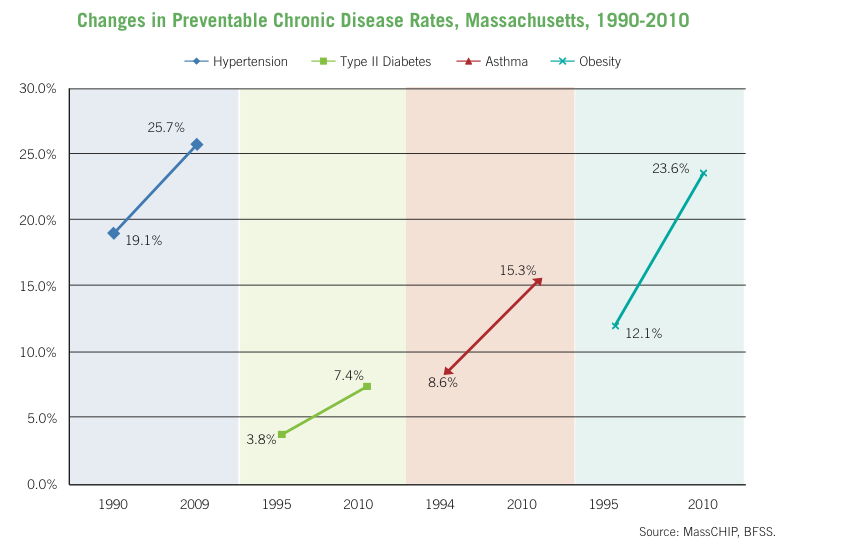BOSTON FOUNDATION & NEHI
Introduction
For medical treatment, there’s no better place to be than Massachusetts. With world-class hospitals and schools of medicine, top-ranked health insurers and insurance reforms and coverage that are a model for the nation, the Commonwealth appears to have everything needed for its residents to enjoy the best of health.
Despite these assets, and despite health care spending rates that are among the highest in the world, however, chronic diseases are on the rise in Massachusetts, as they are nationally. At the same time, obesity—a risk factor for largely preventable chronic diseases such as type 2 diabetes, heart disease and some cancers—is emerging at earlier and earlier ages.
These trends threaten to undermine both residents’ long-term health outcomes and the Commonwealth’s global competitiveness. The rise of obesity and preventable chronic disease reflects a half-century shift in personal behaviors and community conditions: less time for home cooking, easier access to fast food and sugary drinks; less physical labor, more automation; fewer healthy corner stores, more cars and suburban shopping malls; fewer games of kick the can, more videogames.
Nationally, obesity rates have tripled since 1962 from 13 percent, or about one in eight Americans, to 36 percent, or more than one in three Americans in 2010. While Massachusetts’ obesity rate is slightly lower than the nation’s, it is rising across all racial and ethnic groups.
A new study by the Centers for Disease Control and Prevention (CDC), released at its recent “Weight of the Nation” conference, projected that if current trends persist, 42 percent of Americans will be obese by 2030— an additional 32 million people. The report also found that about half of severe adult obesity is a consequence of childhood obesity.
…
Biking And Walking
Background
New research from the well-known, Boston- based Nurses Health Study provides further evidence that regular walking and reduced sedentary time can improve health, even attenuating a genetic predisposition to obesity. Research has shown that every additional hour spent in a car is associated with a six percent increase in the likelihood of obesity, and every additional kilometer walked is associated with a 4.8 percent reduction in the likelihood of obesity. Furthermore the Alliance for Walking and Biking found that states with the highest levels of bicycling and walking to work have lower levels of obesity on average.
Where We Are Today
- Boston ranks as the number one biking and walking city in the U.S., both for the percentage of people who commute by biking (1.5 percent) or walking (13.9 percent) and for lowest biker fatalities (1.0 fatalities per 10,000 daily cyclists) and pedestrian fatalities (0.9 fatalities per 10,000 daily pedestrians).
- In comparison, Massachusetts as a whole ranks 7th best among the states for the percentage of people who commute by biking (0.7 percent) and walking (4.6 percent) and 9th for lowest biker fatalities (2.1 fatalities per 10,000 daily pedestrians) and pedestrian fatalities (1.9 fatalities per 10,000 daily bicyclists).
- However, both Boston and Massachusetts rank much lower in regards to per capita funding for bicycling and walking: they are ranked 25th and 42nd, respectively.
Best Practices
- Building or reconstructing streets as “complete streets” is a critical step toward encouraging walking and biking. “Complete streets” include ample sidewalks for walking and bicycle lanes to allow for safe and free- flowing bicycle traffic. Complete streets are an objective of the Massachusetts Healthy Transportation Compact, and the state
is conducting workshops for municipal officials throughout the state. - In July 2011, Boston began the New Balance Hubway bike sharing program. During its inaugural season (July – November) the Hubway logged more than 140,000 rides, signed up more than 3,700 annual members and nearly 30,000 casual users. The Hubway program’s 2012 season started in March with more than 5,000 members. Fundraising efforts are underway to expand the program throughout Roxbury, Downtown Boston, the Back Bay, Charlestown, Jamaica Plain and Dorchester. Cambridge, Brookline and Somerville are currently finalizing contracts and will be launching in 2012 more than 30 stations.
- The Patrick Administration announced in January 2012 the MBTA & Boston Bikes Developers Challenge. This challenge encouraged the development of apps that help Boston residents use the MBTA and New Balance Hubway to travel through the Boston area. These apps highlight the transit connections between the two transportation systems.
Read full report (PDF) here: Healthy People/Healthy Economy Report Card
About the Boston Foundation
www.tbf.org
“The Boston Foundation, Greater Boston’s community foundation, is one of the oldest and largest community foundations in the nation, with net assets of $850 million. In 2011, the Foundation and its donors made almost $78 million in grants to nonprofit organizations and received gifts of $81 million. The Foundation is made up of some 850 separate charitable funds established by donors either for the general benefit of the community or for special purposes. The Boston Foundation also serves as a major civic leader, provider of information, convener and sponsor of special initiatives designed to address the community’s and region’s most pressing challenges.”
About NEHI
www.nehi.net
“NEHI is a national health policy institute focused on enabling innovation to improve health care quality and lower health care costs. In partnership with members from all across the health care system, NEHI conducts evidence- based research and stimulates policy change to improve the quality and the value of health care. Together with this unparalleled network of committed health care leaders, NEHI brings an objective, collaborative and fresh voice to health policy.”
Tags: Boston Foundation, Healthy People/Healthy Economy, Massachusetts, NEHI







 RSS Feed
RSS Feed